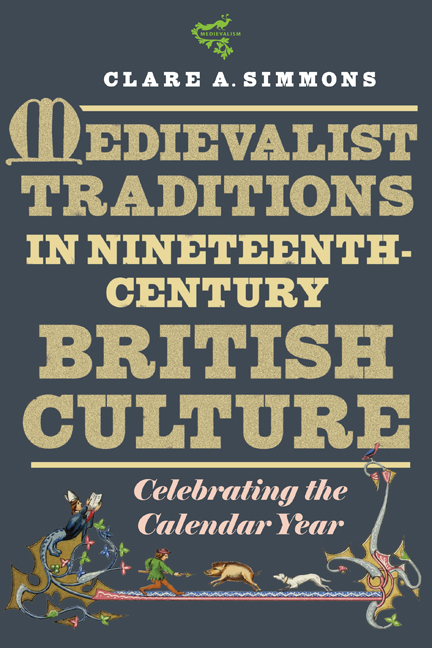Book contents
- Frontmatter
- Dedication
- Contents
- List of Illustrations
- Preface
- Acknowledgments
- List of Abbreviations
- Introduction: Medievalizing Time
- 1 The Christian and Not-So-Christian Year
- 2 Medievalist Calendar Experiments
- 3 Christmas Becomes a Season
- 4 Winter Love: St Agnes and St Valentine
- 5 Rites of Spring: Imagining Origins
- 6 Summer Festivals: Religion in Performance
- 7 Fragmented Autumn: Harvest-Home to Lord Mayor's Show
- Epilogue: Christmas Ghosts
- Bibliography
- Index
- Miscellaneous Endmatter
3 - Christmas Becomes a Season
Published online by Cambridge University Press: 09 February 2021
- Frontmatter
- Dedication
- Contents
- List of Illustrations
- Preface
- Acknowledgments
- List of Abbreviations
- Introduction: Medievalizing Time
- 1 The Christian and Not-So-Christian Year
- 2 Medievalist Calendar Experiments
- 3 Christmas Becomes a Season
- 4 Winter Love: St Agnes and St Valentine
- 5 Rites of Spring: Imagining Origins
- 6 Summer Festivals: Religion in Performance
- 7 Fragmented Autumn: Harvest-Home to Lord Mayor's Show
- Epilogue: Christmas Ghosts
- Bibliography
- Index
- Miscellaneous Endmatter
Summary
IN THE 1860s the composer Charlotte Alington Barnard (1830–69) wrote to Ann Margaretta Higford Burr (1817–92) thanking her for her invitation and regretting that she would be unable to visit due to prior engagements. She adds, “We have spent a very cheerful Christmas this year as the Yarboroughs entertained for three weeks and it was delightfully like the old fashioned Christmas wh: so few keep up now.” Barnard says nothing more on the subject, but the assumption is that Mrs Burr will agree that the celebration of Christmas is in decline.
The notion that Christmas celebration was on the wane in the 1860s is significant since over the course of the nineteenth century, multiple attempts had been made to revive the “old Fashioned Christmas.” In Washington Irving's Sketch-Book and “Bracebridge Hall” stories written around 1820 but reprinted in many forms, Christmas traditions are depicted as fading away. The sketches that open the second volume depict the dying traditions of the English Christmas season, which enhance the American visitor Geoffrey Crayon's feeling that in “those honest days of yore … the world was more homebred, social, and joyous than at present.” Those residing in the English countryside were, says Crayon, “in former days, particularly observant of the religious and social rites of Christmas” that seemed:
to throw open every door, and unlock every heart. It brought the peasant and the peer together, and blended all ranks in one warm generous flow of joy and kindness. The old halls of castles and manor houses resounded with the harp and the Christmas carol, and their ample boards groaned under the weight of hospitality. (2:8)
Although Crayon is vague as to when these times might have been, references to Gothic and baronial halls and harps suggest that he is memorializing not just the past of a century ago, but the Middle Ages. “Christmas” further notes that “traditionary customs of golden-hearted antiquity, its feudal hospitality and lordly wassailings” have passed away.
Later editions of Irving's collected sketches are dedicated to Sir Walter Scott, probably in recognition of Scott's role in uncovering traditions, but perhaps partly because of the lament of the decline of Christmas in Marmion, a passage quoted by almost every antiquarian of the period.
- Type
- Chapter
- Information
- Medievalist Traditions in Nineteenth-Century British CultureCelebrating the Calendar Year, pp. 62 - 93Publisher: Boydell & BrewerPrint publication year: 2021

